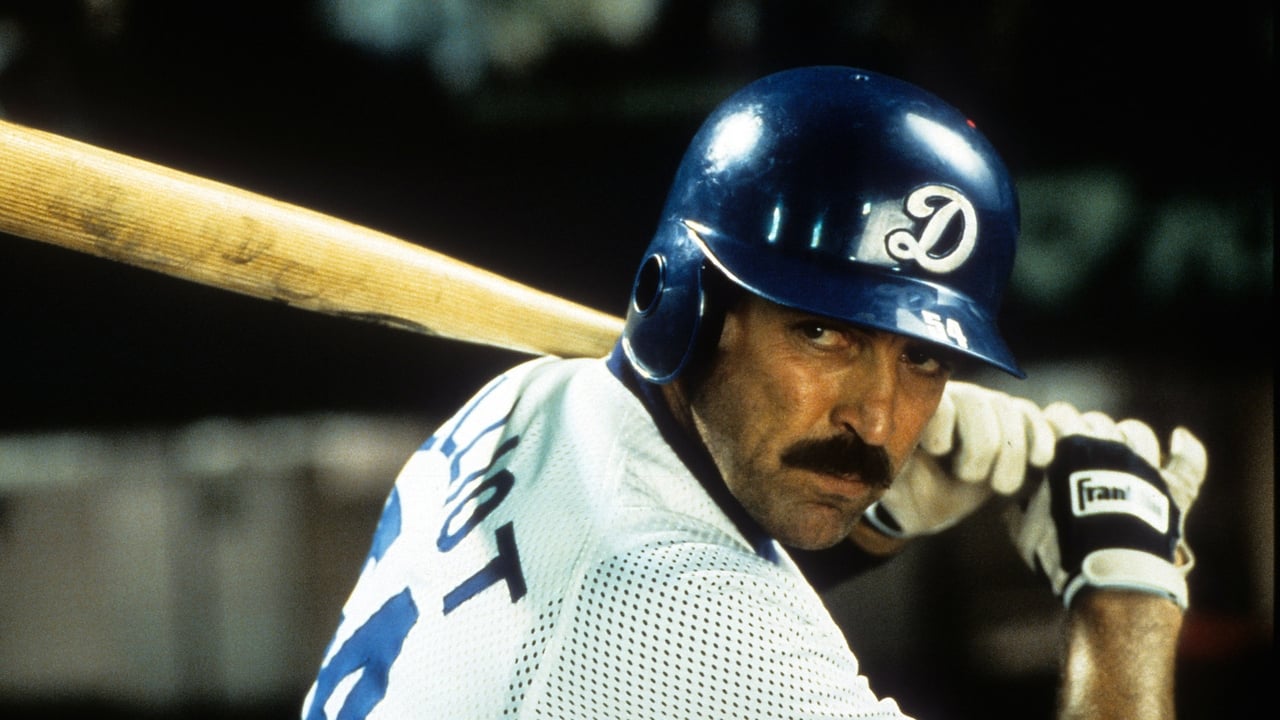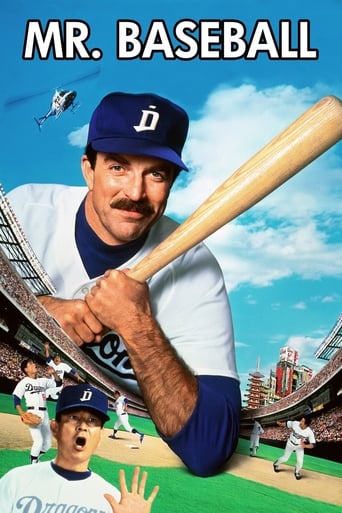

"Jack Elliot" (Tom Selleck) is an aging baseball player for the New York Yankees whose career is clearly coming to an end. So when the Yankees acquire a rookie with exceptional talent he is traded to another team—in Japan. Needless to say he is quite unhappy with this new turn of events and firmly believes that another American baseball team will pick him up soon. Unfortunately, the opposing pitchers in Japan have discovered a "hole in his swing" and as a result his batting percentage plummets—as does his chance to sign with a major league team. Now rather than reveal any more of this movie and risk spoiling it for those who haven't seen it I will just say that while this was an enjoyable baseball film it also had some graphic language which didn't necessarily belong in the movie. Even so Tom Selleck put on an excellent performance as did Ken Takakura (as the manager "Uchiyama") along with Toshi Shioya (as Jack's interpreter "Yoji Nishimura"). In any case, all things considered I rate this movie as slightly above average.
... View MoreMr. Baseball casts Tom Selleck as an aging first baseman for the New York Yankees who is cast adrift by his team when they sell his contract to a Japanese team. Not that it ever has been done in real life, but I can't see why it couldn't happen unless a ballplayer has a smart agent and inserts a clause preventing same.As early as the Sixties aging ballplayers from the states have gone to Japan when no one wanted them any more in organized baseball here in the USA. Better the Major Leagues in that country than the Minor Leagues here. I recall Larry Doby and Don Newcombe as two players who went to Japan in their declining years when I was a lad. Baseball has been popular there since Babe Ruth led an all star contingent of our best players in 1934 to Japan. It was on that trip that Moe Berg was gathering intelligence. Not even World War II killed the sport, in fact it was a point of contact during the US occupation.Selleck in Japan has a lot of trouble adapting to the Japanese style where it is considered bad form to argue too much with an umpire or try and take out a second baseman or shortstop to break up a double play. Guys like Earl Weaver or Dallas Green or Billy Martin would have gone nuts there. He's also having trouble adapting to Japanese culture in general. Helping him along is Aya Takanashi who is a public relations person for the club and daughter of the manager Ken Takakura who is a real hard nosed character. Of course when Selleck and Takanashi get to kanoodling he doesn't know she's Takakura's daughter.Takakura learns something from Selleck, that organized baseball is a bunch of men being well paid to play a game that they are skilled at and an element of fun must be involved. I remember a lad when Stan Musial retired after the 1963 season he said that he knew that he would retire when he no longer got any enjoyment out of putting on the uniform of the St. Louis Cardinals and playing the game. When it was just work and the body aches out lasted the enjoyment it was time to quit. Selleck has that same philosophy.So many of Japan's baseball stars now play in the states that their leagues almost serve as a super minor league for our's. And this review is dedicated to one of the best of them, Ichiro Suzuki. Japan integrating the American baseball scene truly arrived when Ichiro broke the long standing record of George Sisler for most base hits in a single season. As Babe Ruth and his all stars showed the Japanese about baseball, Ichiro shows us now how well they learned the game. And if it wasn't for that trip, Mr. Baseball would never have been made.
... View MoreMr. Baseball is probably saved from status as a total strikeout thanks to the charm that Tom Selleck emits as the aging baseball player traded to a Japanese team. This one was released several years after Ron Howard's 'Gung Ho,' which explores the differences in American and Japanese work ethic in the story of a Japanese company taking over a Midwestern auto plant.The theme is the same, but the situation here is obviously a little different. Selleck's character after a less-than-average career game is sent to Japan to play on a team of both Japanese and other exiled American ballplayers. His contempt for his situation and expectations that he will soon enough be playing in the states again does not make for an easy adjustment. He especially grows impatient with the overabundance of rules and work ethic that turn potentially good players into athletes who are reluctant to show off their skills because of fear of disrespecting some superior or symbolic notion. And, Selleck's attempts to ignore this or call attention to it only furthers the rift between he and the stern team manager. Of course, when Selleck unwittingly starts dating the manager's daughter, she plays the go-between who tries to create this understanding among the two and essentially, close this culture gap through a compromise between the stubborn ballplayer and the equally stubborn manager, and soon between the team and the traditions that get in the way of a good game.There is something here, however, that makes this film a particularly weak one, as far as feeling and believability. Selleck does have his usual sly humor and charm that is probably best compared to his character in the Three Men and a Baby Series. But, it is perhaps for lack of truly funny moments like those in Gung Ho that make this more of a forgettable than memorable baseball film or even as one from the culture clash genre.
... View MoreThis has always been a favorite movie of mine. I've owned a VHS copy, and a couple of months ago I found a DVD release which is also part of my video collection. I also happen to be a huge baseball fan, and as part of my off-season reading, I picked up a copy of Robert Whiting's excellent book "You Gotta Have WA", that profiles the ins and outs of Japanese baseball, and the challenges that foreign players have encountered playing in Japan. As I began to read yesterday, it made me think of this movie, because it appears the screenplay was based almost verbatim on this book. The parallels are uncanny. The Jack Elliot character closely resembles Bob Horner, an aging MLB slugger whose best days were behind him. Horner's teammate Leon Lee is also depicted in the character Max "Hammer" Dubois, a veteran in the Japanese league who has made his peace with the frustrations of the Japanese game, and helps keeps his teammate sane. The Elliot character goes through the same sequence of encounters as Horner, from big fanfare signing, early success that fuels an already ravenous sports media, and the ensuing slump that spurs frustration, alienation from teammates, fans and media, and the resulting disillusionment that prompts a desire to go back home to the US. The only difference is that the movie adds such Hollywood touches as a love interest and a happy ending. Speaking of love interests, I'm sure many viewers have come to this site (as I did) to look up the actress who played "Hiroko" (the beautiful Aya Takanashi), and what other work she has done. It only lists this movie. It turns out, based on an article I read, that the brief love scene she has with Tom Selleck (a foreigner) in this movie (mild by our standards - basically they kiss while he's in the bath and she's wearing a towel) caused such an outrage on the part of the Japanese public (males in particular) that she has never been offered another role of any kind, in Movies or television - essentially blackballed by the Japanese movie industry. It's a real shame, as she is(was) quite a talented actress in this movie. If you like this movie as much for the baseball elements and cultural differences as I did -- go find a copy of "You Gotta Have WA" by Robert Whiting. A good read and a great companion book to this movie.
... View More